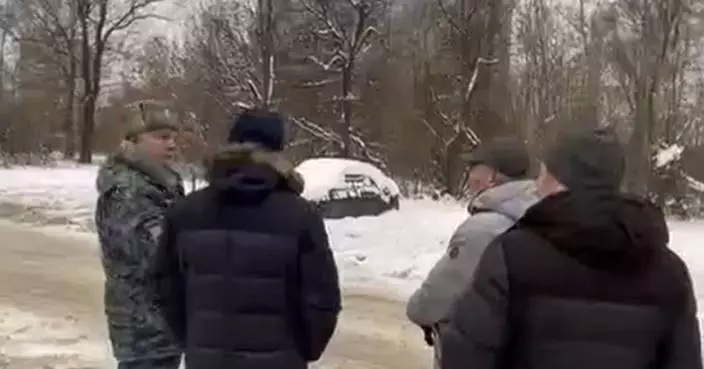GENEVA (AP) — The right-to-die activist behind a new “suicide capsule” says he rejects “absurd” allegations that the U.S. woman who was said to be its first user may have actually been strangled.
Philip Nitschke of advocacy group Exit International said Wednesday he wasn't on hand for the woman's death on Sept. 23 involving the “Sarco” capsule in a forest in northern Switzerland, but saw it live by video transmission.
The device worked as planned, he said, in the first and only time it has been used.
The head of a Swiss affiliate of Exit International known as The Last Resort, Florian Willet, was present at the woman's death and was immediately taken into police custody, where he remains as police investigate the circumstances around the woman's death.
EDITOR’S NOTE — This story includes discussion of suicide. If you or someone you know needs help, the national suicide and crisis lifeline in the U.S. is available by calling or texting 988. There is also an online chat at 988lifeline.org. The Swiss government refers queries about suicide prevention to a group called “Dargebotene Hand,” or The Offered Hand.
Several other people — including a journalist for the Volkskrant newspaper in the Netherlands, where Nitschke lives — were initially taken into custody and prosecutors opened an investigation on suspicion of incitement and accessory to suicide. They were later released.
The Australian-born Nitschke broke weeks of silence through an interview with respected Swiss newspaper Neue Zuercher Zeitung, which was published Wednesday.
Speaking to The Associated Press by phone, he said he felt compelled to speak out because Exit International was “desperate” about the plight of Willet, who could remain behind bars for weeks or months until a possible trial.
He said prosecutors have asked for an extension of Willet's detention, “claiming there was now evidence of homicide.” He denied the accusation.
“We’ve got to try and do something about the fact that Florian has been stuck in prison now for about 58 days,” Nitschke said. He said he offered to travel to Switzerland to speak to prosecutors as part of their investigation and share video footage and oxygen-level data in the capsule at the time the woman died.
“We will provide everything we’ve got,” he said, adding that prosecutors “have not accepted that suggestion.”
Swiss law allows assisted suicide so long as the person takes his or her life with no “external assistance” and those who help the person die do not do so for “any self-serving motive,” according to a government website.
Switzerland is among the only countries in the world where foreigners can travel to legally end their lives and has a number of organizations that are dedicated to helping people kill themselves.
Nitschke has repeatedly said Exit International’s Swiss lawyers had advised that use of the capsule would be legal in Switzerland.
The “Sarco,” which Nitschke has said cost $1 million to develop and build, was designed to allow a person sitting in its reclining seat to push a button that injects nitrogen gas into the sealed chamber. The person is then supposed to fall unconscious and die by suffocation in a few minutes.
The 64-year-old woman was not identified. Nitschke, a trained medical doctor, said she had “compromised immune function” that made her “subject to chronic infection.”
On Oct. 26, Volkskrant reported the Swiss prosecutor had indicated in court that the woman may have been strangled. The Volkskrant article last month said one of its photographers, two lawyers, and Willet were originally detained on suspicion of inciting suicide and providing assistance in doing so.
“It is absurd because we’ve got film that the capsule wasn’t opened," Nitschke said. “Everything happened exactly as we had predicted. The woman climbed into the Sarco alone, closed the lid without help and pressed the button that released the nitrogen herself. She lost consciousness and died after about six minutes."
He added that Willet held a mobile phone through which Nitschke watched live video of the woman using the Sarco, and informed the police immediately afterward that she had died.
Nitschke recalled speaking to Willet through the phone at the time, saying: "I was listening and answering his questions and calming him down because it was a very tense time for him.”
Peter Sticher, the prosecutor for the northern Schaffhausen region who is leading the legal case, declined to comment in an email to the AP on Wednesday, citing an ongoing investigation.
Swiss police have confiscated the only operating Sarco device, but Nitschke said another was being produced. He said he wanted a “clear decision” from Swiss courts before using the device in Switzerland again.
Exit presented the “Sarco” to journalists over the summer. Before using it, the group had to overcome technical difficulties including its original designer walking out of the project, Nitschke has said.
The Sarco has been billed as a novel, peaceful way for people to take their own lives with a push of a button, such as in a bucolic landscape of their choosing.

FILE - Philip Nitschke, founder and director of the pro-euthanasia group Exit International, attends a press conference in Basel, Switzerland, on May 9, 2018. (Georgios Kefalas/Keystone via AP, file)

FILE - A 'suicide pod' known as 'The Sarco' is seen in Rotterdam, Netherlands, July 8, 2024. (AP Photo/Ahmad Seir, File)













